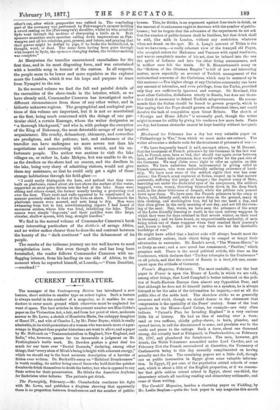Blackwood for February has a dry but very valuable paper
on "Philanthropy in War," from which we must make one extract. The writer advocates a definite code for the treatment of prisoners of war :— "We have frequently heard it said, amongst others, by M. Dunant, that the treatment of French prisoners by the Germans in the last war had, to French eyes, been so bad, that should war again occur between them, and France take prisoners, they would suffer for the past sins of the Germans. We may claim some right to offer an opinion on this matter. We have ourselves been instrumental in giving relief to French prisoners, who were undoubtedly suffering extremes of hard- ship. We have seen some of the saddest sights that war has ever shown: the French army captured at Sedan, cooped up in that narrow peninsula, suffering the pangs of hunger ; the captive army of Metz, marching out under the disdainful eyes of its conquerors, the soldiers haggard, worn, weary, throwing themselves down in the deep black mud, in the sheer bitterness of despair, while the pitiless rain poured down upon them. We have seen the French prisoners in the camp at Mainz, cold, bitterly cold, with the snow deep on the ground, many in thin clothing, and stockingless feet, fed by but one meal a day, and that often given in the early morning of one day, and not till the even- ing of the next. Nay, worse, we have seen the prisoners of the army of the Loire literally freezing to death in the open railway waggons in which they were for days retained in that severe winter, on their road to Germany ; and we have beard, on unquestionable authority, of men being taken out of those waggons when they reached their journey's end, frozen to death. And yet we say these are bat the inevitable hardships of war."


































 Previous page
Previous page